#luddite era
Text
we gotta bring back livejournal and wordpress and forums and weird little blogsites that aren't connected to any social media presence at all its just people online doing online things. the internet is so small now bc we're all squished into the same sites. we used to be so spread out. we used to be a proper decentralised digital culture
#this is why i love ao3 so much tbh its like the only website that still functions like the olden times#no data tracking or whatever and its all communal#we need more of that#does this make any sense#livejournal#wordpress#archive of our own#ao3#old internet#blogging#luddite#luddite era#social media#.txt#alex talks#internet history#greatest hits
206 notes
·
View notes
Text
I do intermittent fasting as my usual schedule. I finish eating dinner and then I fast for 16 or more hours before eating again. I was using an app to track my times, then there was an update and they were like “oh hey! Here’s a quick update to our privacy stuff, you know, all boring stuff, so just go ahead and click through and we’ll be good to go!”
I took at look at how they were using my info and aaaaaaaaaall the fucking companies they were selling to to and holy shit. I literally just use it as a timer. DELETE DELETE DELETE. Goodbye account and app. Then I deleted my period tracker app (yes, I KNOW those are controversial anyway but it was helpful).
All these things keeping tabs on me are just getting to be too much. I’m sick of every little thing I do with my life being recorded and sold and analyzed by… WHO KNOWS WHO LOL??
I have used a physical, paper planner for years. Sounds like the perfect place to jot down my personal stuff, AND NO ONE KNOWS OR MAKES A DIME (except Big Planner, obviously).
#I HATE THIS ERA#Luddite for life#I’m trying to figuratively live in a cabin in the woods as much as possible#just fucking disconnect all of it
40 notes
·
View notes
Text
By Sean Coughlan
BBC News
A diary written by a Yorkshire farmer more than 200 years ago is being hailed as providing remarkable evidence of tolerance towards homosexuality in Britain much earlier than previously imagined.
Historians from Oxford University have been taken aback to discover that Matthew Tomlinson's diary from 1810 contains such open-minded views about same-sex attraction being a "natural" human tendency.
The diary challenges preconceptions about what "ordinary people" thought about homosexuality - showing there was a debate about whether someone really should be discriminated against for their sexuality.
"In this exciting new discovery, we see a Yorkshire farmer arguing that homosexuality is innate and something that shouldn't be punished by death," says Oxford researcher Eamonn O'Keeffe.
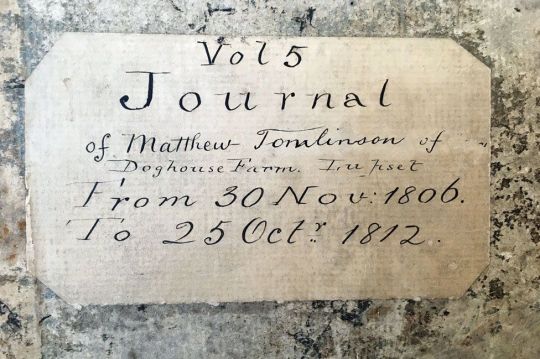
The diaries were handwritten by Tomlinson in the farmhouse where he lived and worked
The historian had been examining Tomlinson's handwritten diaries, which have been stored in Wakefield Library since the 1950s.
The thousands of pages of the private journals have never been transcribed and previously used by researchers interested in Tomlinson's eye-witness accounts of elections in Yorkshire and the Luddites smashing up machinery.
But O'Keeffe came across what seemed, for the era of George III, to be a rather startling set of arguments about same-sex relationships.
Tomlinson had been prompted by what had been a big sex scandal of the day - in which a well-respected naval surgeon had been found to be engaging in homosexual acts.
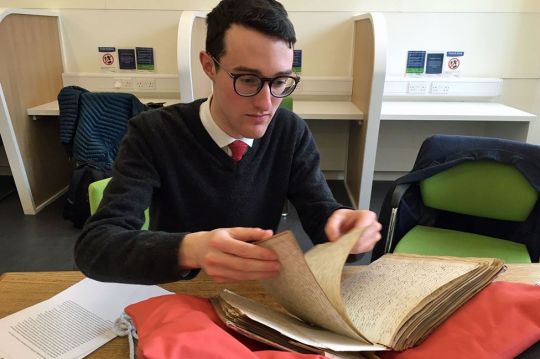
Historian Eamonn O'Keeffe says the diaries provide a rare insight into the views of "ordinary people" in the early 1800s
A court martial had ordered him to be hanged - but Tomlinson seemed unconvinced by the decision, questioning whether what the papers called an "unnatural act" was really that unnatural.
Tomlinson argued, from a religious perspective, that punishing someone for how they were created was equivalent to saying that there was something wrong with the Creator.
"It must seem strange indeed that God Almighty should make a being with such a nature, or such a defect in nature; and at the same time make a decree that if that being whom he had formed, should at any time follow the dictates of that Nature, with which he was formed, he should be punished with death," he wrote on January 14 1810.
If there was an "inclination and propensity" for someone to be homosexual from an early age, he wrote, "it must then be considered as natural, otherwise as a defect in nature - and if natural, or a defect in nature; it seems cruel to punish that defect with death".
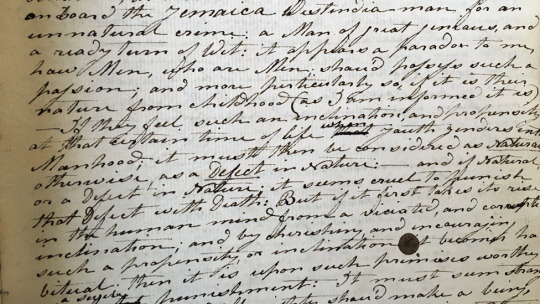
The diarist makes reference to being informed by others that homosexuality is apparent from an early age - suggesting that Tomlinson and his social circle had been talking about this case and discussing something that was not unknown to them.
Around this time, and also in West Yorkshire, a local landowner, Anne Lister, was writing a coded diary about her lesbian relationships - with her story told in the television series, Gentleman Jack.
But knowing what "ordinary people" really thought about such behaviour is always difficult - not least because the loudest surviving voices are usually the wealthy and powerful.
What has excited academics is the chance to eavesdrop on an everyday farmer thinking aloud in his diary.
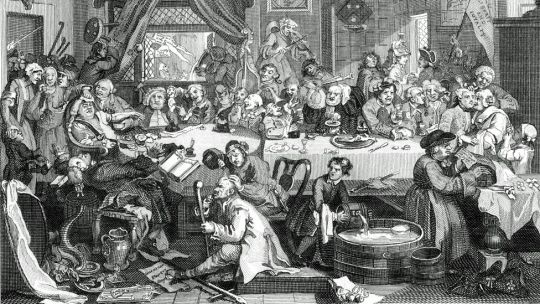
Tomlinson was appalled by the levels of corruption during elections
"What's striking is that he's an ordinary guy, he's not a member of the bohemian circles or an intellectual," says O'Keeffe, a doctoral student in Oxford's history faculty.
An acceptance of homosexuality might have been expressed privately in aristocratic or philosophically radical circles - but this was being discussed by a rural worker.
"It shows opinions of people in the past were not as monolithic as we might think," says O'Keeffe, who is originally from Canada.
"Even though this was a time of persecution and intolerance towards same-sex relationships, here's an ordinary person who is swimming against the current and sees what he reads in the paper and questions those assumptions."
Claire Pickering, library manager in Wakefield, says she imagines the single-minded Tomlinson speaking the words with a Yorkshire accent.

There are three volumes of Tomlinson's diaries at Wakefield Library
He was a man with a "hungry mind", she says, someone who listened to a lot of people's opinions before forming his own conclusions.
The diary, presumably compiled after a hard day's work, was his way of being a writer and commentator when otherwise "that wasn't his station in life", she says.
O'Keeffe says it shows ideas were "percolating through British society much earlier and more widely than we'd expect" - with the diary working through the debates that Tomlinson might have been having with his neighbours.
But these were still far from modern liberal views - and O'Keeffe says they can be extremely "jarring" arguments.
If someone was homosexual by choice, rather than by nature, Tomlinson was ready to consider that they should still be punished - proposing castration as a more moderate option than the death penalty.

Tomlinson's former home was still there in the 1930s (bottom left), but has since disappeared beneath housing and a golf course
O'Keeffe says discovering evidence of these kinds of debate has both "enriched and complicated" what we know about public opinion in this pre-Victorian era.
The diary is raising international interest.
Prof Fara Dabhoiwala, from Princeton University in the US, an expert in the history of attitudes towards sexuality, describes it as "vivid proof" that "historical attitudes to same-sex behaviour could be more sympathetic than is usually presumed".
Instead of seeing homosexuality as a "horrible perversion", Prof Dabholwala says the record showed a farmer in 1810 could see it as a "natural, divinely ordained human quality".
Rictor Norton, an expert in gay history, said there had been earlier arguments defending homosexuality as natural - but these were more likely to be from philosophers than farmers.
"It is extraordinary to find an ordinary, casual observer in 1810 seriously considering the possibility that sexuality is innate and making arguments for decriminalisation," says Dr Norton.
Who was the writer of this diary?
Matthew Tomlinson was a widower, in his 40s when he wrote his journal in 1810 - a man of a "middling" class, not a poor labourer but not rich enough to own his own land.
"I try and imagine how he would have looked," says library manager Ms Pickering.
There are no pictures of Tomlinson, who is thought to have lived between about 1770 and 1850.
"Very dour," she suggests. And a "bit of a hypochondriac".

There are thousands of pages of handwritten journals - but some volumes appear to have been lost
"I imagine if you stopped him at his gate for a chat he'd talk about his gout more than anything else.
"I'd love to have a conversation with him about what Wakefield was like at the time," she says.
No-one knows how these private diaries, covering 1806 to 1839, ended up in Wakefield Library, but they were there by the 1950s and are presumed to be part of an earlier acquisition of old books and local documents.
There are three surviving volumes and at least another eight are missing.
But they show vivid detail about life in Wakefield in the early 19th Century.

Tomlinson, from his home at Doghouse Farm, recorded the life of nearby Wakefield
During elections, Tomlinson was appalled by the corruption, the rum drinkers having to be carried home in wheelbarrows and the "hired ruffians".
And at Queen Victoria's coronation he was sceptical about expensive ceremonies and celebrations, calling them all "humbug".
This was not a closed world. His social circle seemed to be avid readers of books and newspapers, following reports of revolutions abroad and riots and insurrections at home.
They saw elephants marching through Wakefield in a circus parade and military bands who had competed to hire the most talented black musicians.
We know where he lived - Doghouse Farm in Lupset, because he carefully wrote it on the front of his journals.
The farm, at the edge of the landowner's estate, is now under a housing estate and a golf course. All that survives are his diaries.
619 notes
·
View notes
Text
i’m aware i’m preaching to the choir in saying this but honestly! the hyper-speed of consumption in the streaming era is just!!! so unfair to a work like sandman
for so many older fans who read and loved the comics, it’s been a wait of decades to see this adaptation come to the screen. and for neil himself it’s been decades to see this work adapted in a way he wanted. i only just turned 30 and even for me, a younger fan, it’s been over a decade of loving sandman. it’s an incredible experience to actually have this show, for it to be so beautifully and faithfully made, for it to be a labor of love made by actors who have read the comics themselves, who love and understand the characters
and all media companies care about is consumption, everything is content, we’re expected to be consumers and rush through it and move on to the next thing
but like, it’s a work of actual art! not to sound like a luddite or something but it’s not meant to be congruent with that model!
i don’t want to rush through it or move on to the next thing
sandman is a work about stories, about people’s lives, fundamentally it’s about the power of story. it’s unique for a work like sandman to be on our screens and to be able to tell the story it has to tell. and it isn’t fair that the modern media mentality doesn’t support storytelling and the organic growth of derivative work anymore
the fact that neil gaiman has to, that any of us have to, sit around worrying about numbers, about waning interest in something so meaningful that has been around since 1989????? is so fucking unfair
1K notes
·
View notes
Text

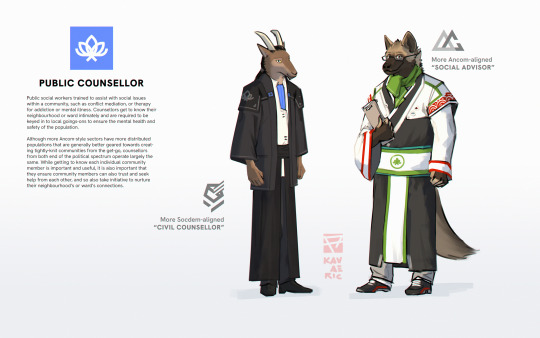

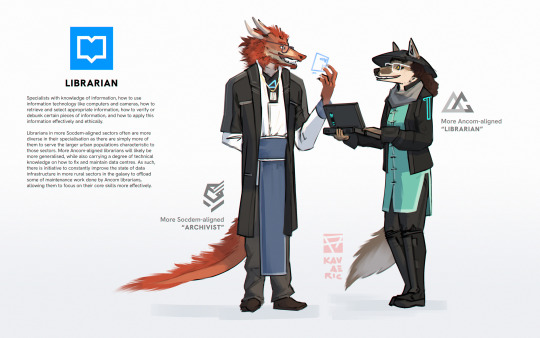
A series of occupational factional differences between the SocDems and Ancoms in Light Era, from 2021.
Commentary (and bonus memery) below.
I think that a lot of independent sci-fi projects I see around aren't very compelling to me because I find they re-tread the same ground. Especially after being a moderator of the largest online worldbuilding community for about two years, eventually you get tired of seeing the same re-hashed discussions and "explorations" of space travel, biomedical science, militaries, that sort of thing. I'm no less guilty, but I figured I might as well try to push it in new directions.
For background, in Light Era, the Terrans are largely split into two large factional groups: the Social Democrats are a urban, industrious, highly technocratic, let's-build-some-cool-stuff people, whereas the Anarcho-Communists are far more relaxed, go-with-the-flow, communal, and almost luddite-like by contrast. There's more to them than that, which I will get to in the future, but that's a workable distinction for now.
I didn't want the factions to be identity politik excuses for conflict like I see in a lot of other scifi works, where each faction is kind of just a shallow superficial vessel with a name and flag. I tried to explore the implications of each faction's doctrine in the way the people live their lives in them instead, and really focus on their philosophies as legitimate cultural artefacts. It seems to be a success, since this is one of the most well-received series of worldbuilding art I've done so far.
I encourage other worldbuilders to take a step back and try this method too. It's harder than just making United League of Space NATO Federation again, I know, but give it a try—I promise your work will be richer as a result.
Anyway, as promised, dorky memery:
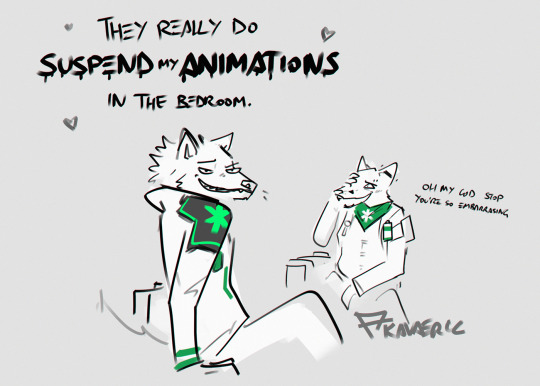
Was it worth it? Probably not. But you've come this far!
#light era#worldbuilding#kouwa#furry#anthro#drawing#lore#sketch#science fiction#futuristic#social democrat#socdem#ancom#anarchist#artwork commentary#factional differences#light era lore#artwork
495 notes
·
View notes
Text
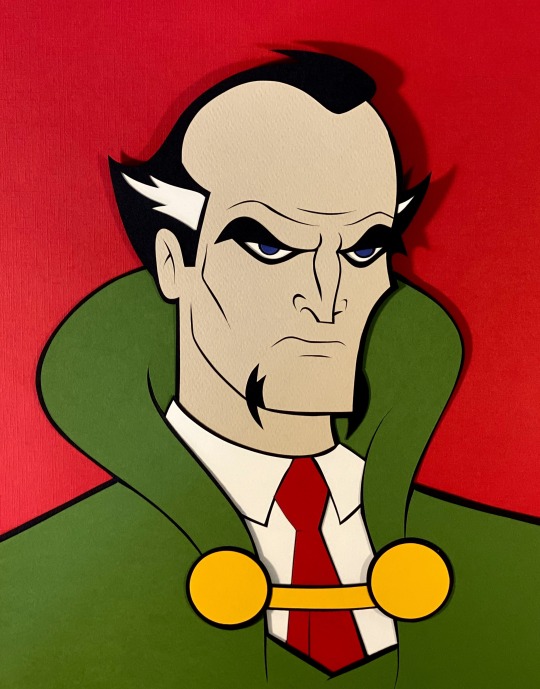
Batman: The Animated Series - Paper Cut-Out Portraits and Profiles
Ra's al Ghul
Born sometime in the 14th century, the man who would go on to become known as Ra's al Ghul discovered an ancient, naturally occurring substance that he called 'Lazarus.' This substance existed in subterranean pools and bathing in it had the capacity to rejuvenate the body, extending life and healing injuries. Use of these Lazarus Pits enabled Ra’s to live for hundreds of years.
Living for so long, Ra’s grew to become a master planner, a shrewd tactician and incredible combatant. He additionally accrued a massive fortune. He saw himself as a steward of the planet, destined to guide mankind away from ecological destruction. A luddite of the highest order, Ra’s believed that technology would bring about the planet’s demise and needed to be stymied in all its forms.
To this end, Ra’s formed a secretive organization known as The Society of Shadows. He took on the name ‘Ra’s al Ghul’ which roughly translates to ‘the demon’s head’ and his followers obeyed his every command as though it was a decree from a godly force.
In the modern era, Ra’s saw a number of his operations hindered by The Batman. Having faced so many unworthy foes, it was actually refreshing to Ra’s to encounter an opponent who offered a true challenge. Above all of Batman’s attributes, Ra’s was most impressed by his skills of deduction and he took to referring to Batman merely as ‘The Detective.’ This admiration aside, Ra’s underestimated Batman and the Dark Knight succeed in thwarting many of Ra’s schemes.
After several hundred years, the rejuvenating powers of the Lazarus Pit was becoming less effective. Comprehending his eventual demise, Ra’s attempted to cajole Batman into taking over his mission as the new leader of Society of Shadows, as well as husband to his beautiful daughter Talia. Batman rejected this offer and hence Ra’s felt compelled to find new means of extending his life so to continue his mission.
The brilliant actor David Warner provided the voice for Ra’s al Ghul, with the villain first appearing in the forty-fourth episode of the first season of Batman: The Animated Series, ‘Off Balance.’
35 notes
·
View notes
Text
Enshitternet

Going to Burning Man? Catch me on Tuesday at 2:40pm on the Center Camp Stage for a talk about enshittification and how to reverse it; on Wednesday at noon, I'm hosting Dr Patrick Ball at Liminal Labs (6:15/F) for a talk on using statistics to prove high-level culpability in the recruitment of child soldiers.
On September 6 at 7pm, I'll be hosting Naomi Klein at the LA Public Library for the launch of Doppelganger.
On September 12 at 7pm, I'll be at Toronto's Another Story Bookshop with my new book The Internet Con: How to Seize the Means of Computation.

This week on my podcast, I read "Enshitternet: The old, good internet deserves a new, good internet," my recent Medium column about building a better internet:
https://doctorow.medium.com/enshitternet-c1d4252e5c6b
As John @hodgman is fond of reminding us, "nostalgia is a toxic impulse." It is easy for an old net.hand like me to fall into the trap of shaking his fist at the cloud. Having been on the other side of that dynamic, I can tell you it's no fun.
When I got on BBSes in the early 1980s, there was an omnipresent chorus of grumps insisting that the move from honest acoustic couplers to decadent modems was the end of the Golden Age of telecommunications:
https://en.wikipedia.org/wiki/Acoustic_coupler
When I got on Usenet shortly thereafter, the Unix Greybeard set never passed up an opportunity to tell us newcomers that the Fidonet-Usenet bridge allowed the barbarian hordes to overwhelm their Athenian marketplace of ideas:
https://technicshistory.com/2020/06/25/the-era-of-fragmentation-part-4-the-anarchists/
When I joined The WELL in the late 1980s, I was repeatedly assured that the good times were over, and that we would never see their like again:
https://www.well.com/
Now that I'm 52, I've learned to recognize this dynamic, from the Eternal September:
https://en.wikipedia.org/wiki/Eternal_September
to the moral panic over menuing systems replacing CLIs:
https://www.eff.org/deeplinks/2020/02/gopher-when-adversarial-interoperability-burrowed-under-gatekeepers-fortresses
to the culture wars over what would happen when the net got a normie-friendly GUI:
https://www.dejavu.org/1993win.htm
And yeah, I've done it too, explaining "Why I won’t buy an iPad (and think you shouldn’t, either)":
https://memex.craphound.com/2010/04/01/why-i-wont-buy-an-ipad-and-think-you-shouldnt-either/
But there's a key difference between my own warnings about the enshittification that new "user friendly" technologies would engender and all those other AARP members' complaints: they were wrong, and I was right.
As Tom Eastman reminded us, the internet really was better, back before it became "five giant websites filled with screenshots of text of the other four":
https://twitter.com/tveastman/status/1069674780826071040
The underlying pathology of that enshittification wasn't the UI, or whether it involved an app store. As the Luddites knew, the important thing about a technology isn't what it does, but who it does it for and who it does it to:
https://locusmag.com/2022/01/cory-doctorow-science-fiction-is-a-luddite-literature/
The problem wasn't which technology we used. There is nothing inherent about touchscreens that makes them into prisons that trap users, rather than walled gardens that protect them.
Likewise, the problem wasn't who made that technology. We didn't swap wise UUCP Monks for venal tech bros. The early tech world was full of public-spirited sysops, but it was also full of would-be monopolists who tried – and failed – to get us to "stop talking to each other and start buying things":
https://catvalente.substack.com/p/stop-talking-to-each-other-and-start
If it wasn't the technology that killed the old, good internet, and if it wasn't the people who killed the old, good internet, where did the enshitternet come from?
It wasn't the wrong tech, it wasn't the wrong people: it was the wrong rules. After all, the Apple ][+ went on sale the year Ronald Reagan hit the campaign trail. Consumer tech was the first industry born after antitrust was dismantled, and it created the modern monopoly playbook: buying and merging with competitors. The resulting unity of purpose and anticompetitive profit margins allowed tech to capture its regulators and secure favorable court and legislative outcomes.
The simultaneous drawdown of antitrust enforcement and growth of tech meant that tech's long-standing cycle of renewal was ended. Tech companies that owed their existence to their ability to reverse-engineer incumbent companies' products and make interoperable replacements and add-ons were able to ban anyone else from doing unto them as they did unto the giants that came before them:
https://doctorow.medium.com/let-the-platforms-burn-6fb3e6c0d980
The pirates became admirals, and set about creating a "felony contempt of business model":
https://pluralistic.net/2022/12/03/painful-burning-dribble/#law-of-intended-consequences
They changed the rules to ensure that they could "disrupt" anyone they chose, but could themselves mobilize the full might of the US government to prevent anyone from disrupting them:
https://locusmag.com/2019/01/cory-doctorow-disruption-for-thee-but-not-for-me/
The old, good internet was the internet we we able to make while tech was still realizing the new anticompetitive powers it had at its disposal, and it disappeared because every administration, R and D, from Reagan to Trump, yanked more and more Jenga blocks out of the antitrust tower.
In other words: the old, good internet was always doomed, because it was being frantically built in an ever-contracting zone of freedom to tinker, where technologies could be operated by and for the people who used them.
Today, the Biden administration has ushered in a new era of antitrust renewal, planting the seeds of a disenshittification movement that will tame corporate power rather than nurturing it:
https://www.eff.org/de/deeplinks/2021/08/party-its-1979-og-antitrust-back-baby
In other words, we are living in the first days of a better nation.
In other words, rather than restoring the old, good internet, we should build a new, good internet.
What is a new, good internet? It's an internet where it's legal to:
reverse-engineer the products and services you use, to add interoperability to them so you can leave a social network without leaving your friends:
https://www.eff.org/interoperablefacebook
jailbreak devices to remove antifeatures, like surveillance, ink-locking, or repair-blocking:
https://pluralistic.net/2023/04/17/have-you-tried-not-spying/#coppa
move your media files and apps from any platform to any device or service, even if the company that sold them to you objects:
https://pluralistic.net/2022/09/07/audible-exclusive/#audiblegate
A new, good internet gives powers to users, and takes power away from corporations:
https://doctorow.medium.com/twiddler-1b5c9690cce6
On a new, good internet, companies can't practice algorithmic wage discrimination:
https://pluralistic.net/2023/04/12/algorithmic-wage-discrimination/#fishers-of-men
They can't turn search into an auction between companies that match your query and companies that want to sell you fakes and knockoffs:
https://pluralistic.net/2022/11/28/enshittification/#relentless-payola
They can't charge rent to the people whose feeds you asked to read for the privilege of reaching you:
https://pluralistic.net/2022/12/10/e2e/#the-censors-pen
In fact, a new, good internet is one where we euthanize rentiers:
https://pluralistic.net/2023/07/24/rent-to-pwn/#kitt-is-a-demon
On the new good internet, your boss can't use bossware to turn "work from home" into "live at work":
https://pluralistic.net/2021/02/24/gwb-rumsfeld-monsters/#bossware
And on top of that, you have the right to hack that bossware to undetectably disable it (and hackers have the right to sell or give you that hack):
https://www.eff.org/deeplinks/2021/08/tech-rights-are-workers-rights-doordash-edition
On the new, good internet, we stop pretending that tech is stealing content from news companies, and focus on how tech steals money from the news, with app taxes, rigged ad markets, surveillance ads, and payola:
https://www.eff.org/deeplinks/2023/04/saving-news-big-tech
The new, good internet is an internet where we seize the means of computation. It's an internet operated by and for the people who use it.
Hodgman is right. Nostalgia is a toxic impulse. The point of making a new, good internet isn't to revive the old, good internet. There were plenty of problems with the old, good internet. The point is to make a new, good internet that is the worthy successor to the old, good internet – and to consign the enshitternet to the scrapheap of history, an unfortunate transitional stage between one good internet and another.
Here's a link to the podcast episode:
https://craphound.com/news/2023/08/21/enshitternet-the-old-good-internet-deserves-a-new-good-internet/
and here's a direct link to the MP3 (hosting courtesy of the Internet Archive; they'll host your stuff for free, forever):
https://archive.org/download/Cory_Doctorow_Podcast_448/Cory_Doctorow_Podcast_448_-_Enshitternet.mp3
and here's a link to my podcast's RSS feed:
https://feeds.feedburner.com/doctorow_podcast

If you'd like an essay-formatted version of this post to read or share, here's a link to it on pluralistic.net, my surveillance-free, ad-free, tracker-free blog:
https://pluralistic.net/2023/08/22/the-new-good-internet/#the-old-good-internet

Image:
Cryteria (modified)
https://commons.wikimedia.org/wiki/File:HAL9000.svg
CC BY 3.0
https://creativecommons.org/licenses/by/3.0/deed.en
#podcasts#mp3s#enshittification#nostalgia#nostalgia is a toxic impulse#spoken word#the old good internet#the new good internet
60 notes
·
View notes
Text
Fic Anniversary post
(If I could make banners there would be such a neat banner here - but my technological ineptitude puts me a step above luddite lol)
A year ago (not today, March the 29th, but here we are) I started this fic because I wanted to write about TK's early life and I loved the idea of him not being an only child - specifically of him having a younger sister. Sophie is born when TK is five, and while this is divergent of canon because in the show he is an only child, I try to keep it as close to canon as I can given the details we've been given in the show about TK's life.
It's called Growing Up, Strand Style - it starts in 1999 when Sophie is born and TK is five years old.
it's up to 48 chapters now. It has a lot of run-on sentences and a lot of pop culture references that are era-appropriate.
Currently, TK is seventeen and Sophie is almost twelve. This is from the upcoming chapter -
“They have champagne? This is a fancy place”. TK said as he took two off a passing tray.
“TK!” Carson hissed with alarm as TK tried handing him one. “My parents are gonna see!”
“Your dad’s already had like, four,” TK protested, downing his in one gulp. “See? No one noticed. Have you ever had it? It’s really good. It sort of tingles going down your throat”.
“Nuh uh”. Carson shook his head. “Your parents let your drink?”
“Definitely not”. TK laughed. “But my parents aren’t here”. Behind Carson, the ball drop was on the TV, and people were counting down. “I’ve got a way for you to taste it, though,” TK said, stepping closer to his boyfriend. “But only if you want to”. As the new year rang in, TK felt his boyfriend’s hand cup the back of his head as he leaned down to put his mouth on TK’s. Tk’s eyes fluttered closed as he leaned in to Carson’s kiss.
TK actually forgot that they were in a room full of people. He would’ve sworn that he and Carson were the only two people on Earth.
He had never felt a moment so perfect.
“You know, no one wants to see you two do that”. A jeering, and unfortunately, all too familiar voice cut through the noise.
Normally my take on my own writing is something akin to this (I'm sorry I truly never run out of references it's a problem) but I'm lowkey proud of this and can't believe it's been a year since I started writing it, and wanted to share it.
Read on Ao3
13 notes
·
View notes
Text
So what they did with Acronix and Krux, with the younger one being into the modern era, while the boomer twin is a luddite, makes sense. But I wonder if they could've done things the other way around?
For Acronix, his trip through time was but a brief moment; Maybe a few minutes, max! And then all of a sudden everything has changed, including everyone. Many of them are gone, even. Wu is an old man, but so is his brother, and it's like watching your twin just age rapidly in front of your eyes. That can't REALLY be Krux, but seeing him like this confirms it.
The world is alien, and Acronix still hasn't quite adjusted to the fact that it changed; It happened too brief and instantly. Sometimes he wakes up, or subconsciously operates on the assumption that everything is still the same as it was; Krux mentions getting a ride and Acronix expects a carriage, only to be met with a car and all of its foreign smells and sounds and textures.
So of course he wants to go back to the past; He's in denial, he hasn't adjusted, he can't accept that he missed out on so much. It's driving Acronix insane.
Conversely, you have Krux: Who got there the long way. The regular, natural way; Seeing each little change happen one at a time, gradually, at a pace he could easily acclimate to, just like everyone else. And as he adjusted and got used to this, got used to being alone, he grew to at least appreciate the little things that changed and improved, if only to distract himself from the absence of his twin brother.
He remembers what it was like back then, so Krux can actually appreciate how things have improved nowadays, compared to some younger folk who glamorize the past as perfect despite never actually living in it. But then Acronix finally returns and he looks the exact same, and in a way it's a twisted relief because Krux doesn't have to adjust to what he missed out on, Acronix is exactly as he left him, they can pick up where they left off like nothing happened, right?
But his twin... Basically a little brother at this point, he's changed. He's in a crisis because Krux has changed, changed too much that their dynamic is now different. Krux's heart is breaking to see Acronix suffer like this, so he decides, why not? Why not undo all of the decades of progress, all of the present, just to restore the past, just so Acronix can be happy again? So we can grow old together, the normal way, and experience these changes together as we should have?
You can also adjust which Time powers they have, accordingly; For Acronix, he has Forward and Reversal, because he's gone back and forth, he's time-travelled, speeding through time in different directions. For Krux, he has Slow-Mo and Pause, because he got to the future the long way. He took his time, he was able to digest each bit normally, he was patient about it. He's now the older mentor who advises patience to his younger apprentice... Except not exactly, because they're still twins, and also Krux isn't going to make his brother accept what happened, but instead coddle him by breaking reality for Acronix.
Krux looks older and is more mature in a lot of ways, while Acronix is like a stunted child by comparison, because he basically is as someone who didn’t get the chance and time to actually grow up, and is expected to grow up fast but refuses to. Maybe throw in a dynamic with Lloyd, who also had to grow up fast and missed out on a lot, but then actually adjusted to and accepted that. He was the one who chose to grow up literally. And Kai and Nya could parallel the Hands of Time in handling grief in a sense, holding onto some hope that things may come back, but also having to accept change. The fact that Krux is the reason they lost their parents for a while just ties it all together more.
15 notes
·
View notes
Text
All of these eu flag globe emoji ice cream emoji libshits on Twitter calling artists "luddites" for being concerned about losing their jobs to ai, "just get a new job" "adapt to the market"
Die one thousand deaths. I hate liberals I hate liberals!!!! And you can't even compare this to horse-drawn carriage drivers or elevator operators like holy shit, no little kid in the early 20th century had dreams of being a fucking elevator operator. Art is a skill and a passion, people do have dreams of being an artist and have developed that skill over years in hope of getting somewhere.
The more jobs we lose to "progress" the less jobs there will actually be for the average person. There's going to be tech people and engineers and doctors, and then there's going to be an underclass of everyone else who wasn't privileged or educated or abled enough to become a professional in the technological era and have to become Amazon warehouse workers or some shit. Even most minimum wage work is slowly getting replaced and if you think this is helping retail and fast food workers climb the ladder you're dense as fuck.
13 notes
·
View notes
Text
in a moment of weakness i redownloaded tiktok and discovered it was even stupider than it was when i left. i was worried i’d get re-addicted to it but honestly the whole app is so annoying that it completely bypassed my addictive personality and i deleted it in less than an hour
#its so crazy to think that two years ago i was tiktok famous and like making money from it lmao#i live on in people’s minds through silly videos and thats nice#but good lord i am never going back to that awful digital place again#.txt#alex talks#tiktok#luddite era#social media addiction#anti influencer
7 notes
·
View notes
Text
Okay, I know I said I’m not planning on doing this modern Eight Cousins/Rose in Bloom AU, and I’m still not, but I have had a bunch of ideas floating around in my brain. Maybe I’ll write a few snippets or something? Anyway, just to get them out of my brain:
In our modern AU, Rose and Alec won't be related to the Campbells--Alec is such a close friend of the Campbell family (particularly Uncle Mac and Aunt Jane) that the title of "uncle" is honorary. (Gonna have to give them a different last name then...hmmmm...)
They all live on the same street/in the same neighborhood to allow for lots of childhood hijinks.
In replacement of their “circus,” the boys drive around a 20-year-old 15-passenger van that used to belong to their church. It is old, but it’s well kept-up—the Campbells, however affluent they may be, don’t believe in letting things go to waste. Also, the thought of Archie driving six boys around in a dilapidated van like a tired soccer mom amuses me.
Perhaps Phebe is being fostered by the family next door? (She ends up adopted by Uncle Alec eventually, of course.)
The Rose in Bloom era will begin as Rose is starting college
Rose just came back from a gap-year program—she could’ve started the same year as Mac, but Uncle Alec wanted to keep her another year. (Phebe went with her, probably?)
The immediate gut instinct is to make Charlie the popular jock, but it’s actually more textually supported to make him the popular, slightly-unhinged theatre kid who always gets all the main roles. His major is, of course, undecided. (Maybe he’s also a year behind?)
Mac is biology pre-med, but he probably just switched from philosophy or physics or something. (Probably tacks on an English or Writing minor somewhere along the way.)
Unsure about Rose—business or social work?
Archie graduated a year early and went straight into the workforce (doing what though, I’m not sure)
Phebe is studying music, but refuses to let Uncle Alec pay for any of it, and is trying to earn her way through by working multiple jobs at the same time.
Steve would also be starting this year, but honestly I don't know what to do with him. However much he may desire to emulate Charlie, Aunt Jane would be sure to force him to pick a major...perhaps communication?
Since they live so close to the university, they all live at home (Phebe couldn't talk Uncle Alec out of that one), with the exception of Charlie--he managed to convince Aunt Clara to let him live on-campus. As I'm sure you can imagine, this only serves to worsen all the trouble he gets up to.
Speaking of the trouble Charlie gets up to, instead of the Major Incident involving him coming home drunk after New Year's, perhaps it involves him getting caught with alcohol on their (dry) campus.
I honestly don't know if I'm going to have him die in this one. I probably should, because it kind of interrupts the integrity of the story if he doesn't die...but part of me wants him to see Rose and Mac together so he can see what a respectful man looks like, lol. But he will probably still end up dying in a car crash, unfortunately.
Actually, perhaps Rose’s three month “experiment” is that she wants to try living on-campus for a bit, which Uncle Alec is hesitant about, and then she decides to move back home the semester after Charlie’s whole incident. I’m mostly doing this because I want Rose and Kitty Van to be roommates, because that would be outrageously funny
Mac carries a flip-phone, which drives Steve insane, and has threatened to go Luddite on more than one occasion--but never actually would, as he's way too into the modern conveniences of downloadable music for that. Carries a little ipod nano around. He does have a laptop for school, though. Knows a lot about recent technological advances and will regale anyone with his knowledge at the slightest provocation, but will also lecture about how detrimental social media is in the same breath. He doesn't even have a Facebook. ("Even Aunt Plen has a Facebook," Steve moans. "Right, didn't you say that Facebook was for, and I quote, 'old people'?" "Well yeah, but at least it would prove you EXIST." "Have you ever heard of this guy named Descartes?")
I also feel like Mac's the type to own a record player and collect vintage vinyls (although he isn't aware that this is currently a popular thing to do).
All of the boys (with the exception of Charlie, because Aunt Clara let him get out of it) have campus jobs. Mac, of course, works in the library, but I'm not sure about Steve.
I’m not really sure what to do about translating the issue with Charlie taking Rose to parties, as the college parties of today certainly do NOT translate to the sorts of social gatherings in the time period of the original book. The time where she asks Mac to go to a party with her could be an actual campus formal event of some kind, but beyond that, I’m not sure. Perhaps it’s a group of friends that Rose feels uncomfortable being around, but doesn’t want to cut off entirely?
The same goes for Archie and Phebe, as class dynamics in marriages are not as a big of a deal as they were back then, or at least, it won’t translate to the same earth-shattering event that it is in the original book. Unsure what direction to take them, honestly, but their love story is so wonderful, I’d want to do it as much justice as I can. (In theory. As I said, I’m not actively planning on writing this.)
21 notes
·
View notes
Note
Here's a question that just popped into my head;
Why is your avatar/sona a robot catgirl? With how all your works seem to be renaissance or cottage core adjacent (more just "in style" then literally in the era/time period), one would assume your sona would be something more fantastical too, like, an actual cat girl or something. Instead, you're a high Sci-fi android that leans hard into the robot aesthetic.
Was this intentional? An accident? Something in-between? A long-con to reveal that Cemetery Mary actually takes place in a Luddite society in the year 2552?
I've been dying to know for the past eight minutes after I thought about this question in passing.
Because it's fun, and I like it!! ♡
I've always loved robots and catgirls and arcade aesthetics and now I can be all of that in one!
I'd like to make some more sci-fi/futuristic games in the future and stuff too--even if I'm just incorporating elements of them--it's just that all the ideas I have right now fit better into a more whimsical or even modern setting! But I'd love to experiment with more cyber stuff in the future too cause I also really really love that stuff(especially aesthetically)!
19 notes
·
View notes
Text
Netflix’s Goth Technophobes
I kind of love that two of Netflix’s biggest shows depict characters who have an aversion to technology.
First we have Morpheus from Neil Gaiman’s The Sandman. He’s roughly ten billion years old and doesn’t know how to drive and has never used a phone (not even a rotary one). He also has a great deal of trouble understanding casual slang from his sister, Death, and his raven, Matthew.

Then we have Wednesday Addams in the new Addams Family spin-off, Wednesday. She refuses to use a smart phone all through the first season and is given one at the end of the season finale however though she does know how to use it, according to one of the show runners, she very likely tossed it out the window of the car after the credits started rolling. Thing (the disembodied hand) might end up using it instead.
Wednesday loves to write but uses a typewriter instead of a latop or desktop PC. She essentially acts and dresses as if she just crawled out of the Victorian era. My guestimation would be 1897-ish.
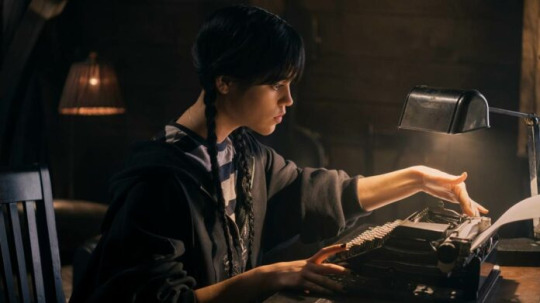
There’s something weirdly refreshing about these old fashioned Goth protagonists and their aversion to tech. It means the writers have to be creative working out how these characters handle situations that generally would be easy to resolve if they had a smart phone. It keeps the writers on their toes and leaves room for creative problem solving within the story where something might have been too easily resolved with the tech.
It also helps remind the audience that these particular characters are timeless. One is an immortal being who rules over our dreams. The other is a Goth little girl who has been pretty consistently depicted since the 1930s without much (if any) real change in characterization.
These are beings who (though for different reasons) exist outside of time. They are in essence “Story.” They are timeless and classic and aren’t bound by the constraints of the era they were created in, nor do they conform to what is convenient for this time period. They are outside of the norm.
I feel the best Gothic characters aren’t constrained by any time period and often work best without state-of-the-art technology shackling them to the moment and allowing them to become dated later.
Long live the Goth technophobes!
Disclaimer: I am not just writing this because I’m also a Goth luddite whose only technology is a fairly new PC and I haven’t used or owned a smart phone in at least six months... Don’t look at me that way! These are my people!
52 notes
·
View notes
Text
An Introduction

There is a serious lack of discussion about the TMNT comics by IDW. Atleast in my eyes. I know realistically that comics are more niche than movies, TV, video games, etc., so discussion is gonna happen way less…
But whatever! I need more people talking about these things, goddammit. With the hype for #150 and a new era beyond that, I need to quell my fixations. Ergo, this blog. These comics are super good, man. The definitive TMNT experience, imo. Not only because it takes different elements from multiple incarnations, but because shits well fucking written lol.
If you're thinking about reading the com- READ IT READ IT READ IT READ IT. Hell, make it a book club or smth. So join me on my journey to analyze, discuss, criticize, and show off this incredible series.

BTW
I don't have a set schedule at all, basically when I feel like it.
I'm going through the comics in the order found in the IDW Collections.
I'm still fairly new to Tumblr btw so if I seem like a luddite, my apologies I guess lol.
4 notes
·
View notes
Note
What did you think of the ending to Endgame? A lot of people loved it, but I know some that hated it too. I know you have thoughts on Steve Rodgers, and would love to hear what you think of him just yeeting into the past and never returning except to throw the shield at Sam and then? Dying? I guess? Or he’s just off somewhere fishing or some crap.
Thoughts about Steve Rogers. Thoughts about Stucky.
Thoughts in General
Oh, anon, I'm an awful person because I laughed.
I laughed because I knew the internet would be in despair. They thought they were going to get their Stucky endgame, finally, after all this time. Surely. Now is the time. NOW IS THE TIME.
What do they get instead?
A "fuck you" from the director as Steve goes back in time, marries Peggy, never comes back, and then is an old man sitting on a bench and goes, "Yeah man, had a blast without you two. Enjoy life."
A thousand voices cried out in agony upon leaving that theater. Cursing all the gods and all the writers who couldn't give them this one, little thing.
That said, for as much as Steve doesn't have much of a character in MCU to work with, it is in character.
What Do You Mean it's in Character?
Steve is a man out of time and place who in Endgame finally comes to terms with that in choosing to remain in the past. He never grew accustomed to the modern era, never really fit into it and always felt lagging behind, and those cornerstones of his world he did have are all dying or lost to him.
Peggy is now dead; she's lived her life and married and had children without him. Howard is also dead. The only connection to them that Steve has is Peggy's niece who... spies on him and flirts every so often?
In Bucky, he had the one piece left from his past, except Bucky throughout the various films really does as much as possible to keep reasonably out of Steve's way. He never chooses to hang around Steve, it's always circumstances forcing them together and usually when they're in the same room he's trying to leave it.
Steve has nothing in the modern era and he's a hero the world has moved past and no longer needs. The modern heroes of the world are those like Sam, these younger, newer, people where he's just the guy who flew a plane into an iceberg and was captain of a team that split apart completely.
In doing this last task I can very much believe that Steve felt he was done, had no reason to return, and instead chose to return to the time and place he felt he belonged and the people he mourned their, content perhaps that Bucky in the future does not need him.
Clearly, from all of this, I'm that luddite who never thought Stucky, at least given what MCU gave us, was ever going to work
...
Though seriously, anon, why are you asking me about Steve Rogers or Bucky or any of this? I am not the person you should go to in these ventures.
#mcu#mcu meta#mcu headcanon#steve rogers#bucky barnes#captain america#winter soldier#meta#headcanon#opinion
65 notes
·
View notes